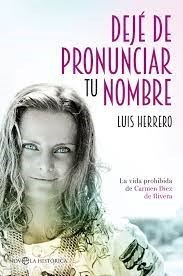The muse of the Spanish transition to democracy.
The beautiful Carmen Díez de Rivera was a cultured and intelligent woman like few others. Nicknamed “the muse of the Spanish Transition to democracy” by Francisco Umbral, she was the illegitimate daughter of the politician Serrano Suñer and the aristocrat Sonsoles de Icaza, a Balenciaga model who shamelessly neglected her daughter. All in all, Carmen had a complicated life.
Carmen and her boyfriend Ramón started dating in their early teens. They had known each other since childhood. As they began to grow older, sensuality, tenderness, affection and love sparked between them. However, in 1959 Carmen and Ramón were forced to end their love abruptly. When Carmen told her family of her intention to marry him, they confessed that Ramón was her brother and that she was actually the daughter of Ramón Serrano Suñer, Franco’s foreign minister, and that she was the fruit of an extramarital affair that her mother had hidden from her. Carmen’s world had been shattered.
Meanwhile, the whole family architecture was crumbling. Carmen did not understand why she had not been warned sooner that this was a forbidden love. And as hard as she tried to overcome this hardship, she was unable to. She continued seeing Ramón for several years, but soon she lost the will to live. Finally, she fell ill, and had to spend years in Paris undergoing treatment for sleep. She then tried to become a cloistered nun in the Carmelite nuns of Arenas de San Pedro. Finally, in an act of desperation, she decided to go to work for an NGO in Africa.
She returned to Madrid in 1967. She became a rebellious aristocrat, befriended members of the underground opposition and fought for the legalization of the Communist Party. Her mother banished her from the family home because of her ideology.
She studied philosophy and political science, specializing in international politics. She was a regular visitor to the Zarzuela Palace, where she met with her friend Juan Carlos de Borbón, the future king. The prince introduced her to Adolfo Suárez. Suárez saw in her a shrewd intelligence and a courageous woman; thus, she began to develop her true passion: politics.
Seven years later, she became Chief of Staff to the President of the Government. For years she worked side by side with Adolfo Suárez and Juan Carlos de Borbón. She convinced them that all parties had to be legalized, including the Communist Party (PCE). Carmen was active in several left-wing parties and was elected MEP on two occasions.
She never remarried and never had children. She spent her last days in Menorca and died in 1999.
RELEVANT DATA: I Stopped Uttering Your Name (Deje de pronunciar tu nombre) is a character-driven drama based on true events. It is a detailed account of the most interesting moments in the life of Carmen Díez de Rivera, a key figure in the history of Spain at the end of the 20th century.
Luis Herrero fills in the gaps in Carmen’s testimony. The result is an account as fascinating as its protagonist, in which her life and all the personal and political circumstances that surrounded her come to light for the first time.
Luis Herrero is a Spanish journalist and writer. He directs and hosts the programs En casa de Herrero and Cowboys de Medianoche for EsRadio. He is a columnist for the newspapers Libertad Digital and ABC. He was a Member of the European Parliament for the Spanish political party Partido Popular.
What the critics say:
“The novel is built with jumps in time, an enormous risk that Herrero resolves successfully and without flinching.” Libertad Digital
“A very entertaining novel. It relates our transition in an elegant way. A little known true story.” Goodreads
AUDIOVISUAL POTENTIAL: TV Series, Miniseries, Film, TV Movie.
LANGUAGES AVAILABLE: Spanish.

Adquirir los derechos
Para ponerte en contacto con nosotros completa el siguiente formulario y te responderemos en breve.

